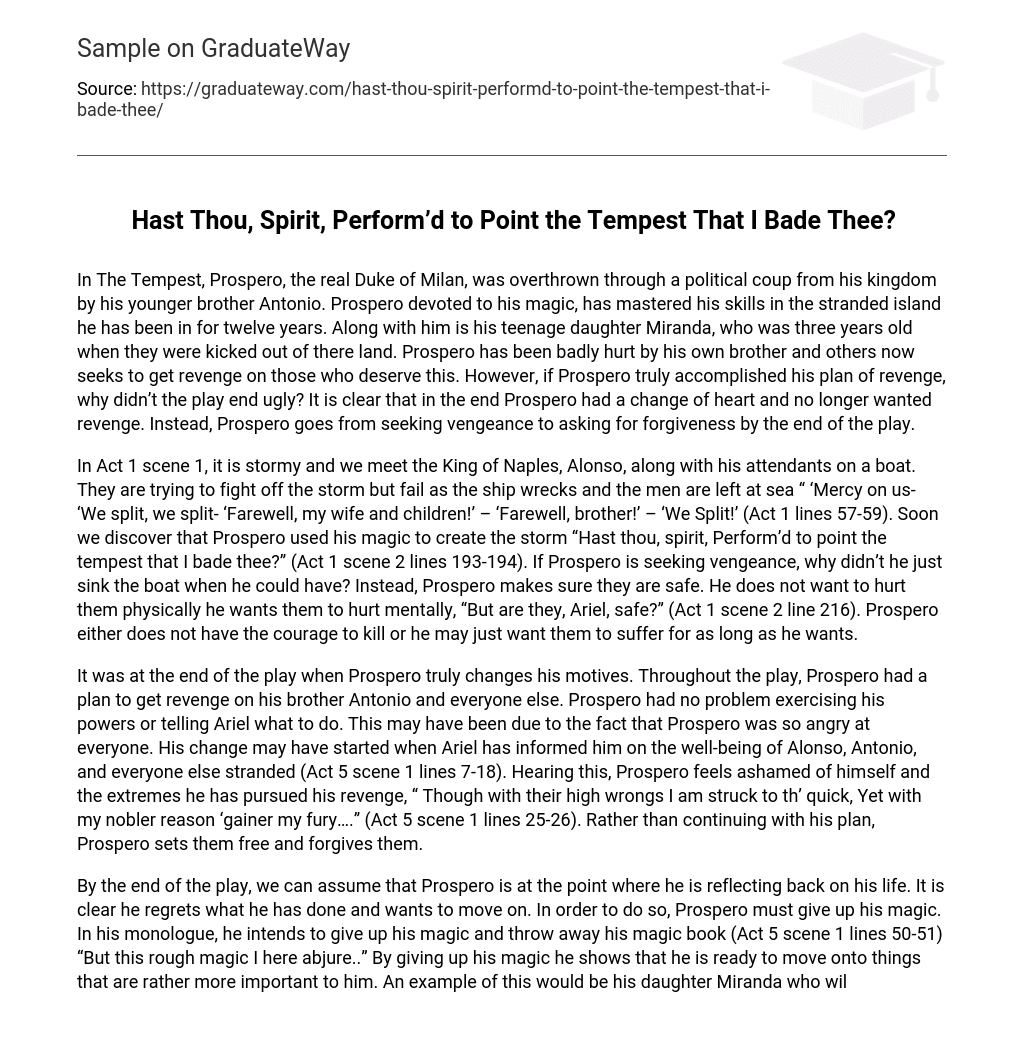In The Tempest, Prospero, the real Duke of Milan, was overthrown through a political coup from his kingdom by his younger brother Antonio. Prospero devoted to his magic, has mastered his skills in the stranded island he has been in for twelve years. Along with him is his teenage daughter Miranda, who was three years old when they were kicked out of there land. Prospero has been badly hurt by his own brother and others now seeks to get revenge on those who deserve this. However, if Prospero truly accomplished his plan of revenge, why didn’t the play end ugly? It is clear that in the end Prospero had a change of heart and no longer wanted revenge. Instead, Prospero goes from seeking vengeance to asking for forgiveness by the end of the play.
In Act 1 scene 1, it is stormy and we meet the King of Naples, Alonso, along with his attendants on a boat. They are trying to fight off the storm but fail as the ship wrecks and the men are left at sea “ ‘Mercy on us- ‘We split, we split- ‘Farewell, my wife and children!’ – ‘Farewell, brother!’ – ‘We Split!’ (Act 1 lines 57-59). Soon we discover that Prospero used his magic to create the storm “Hast thou, spirit, Perform’d to point the tempest that I bade thee?” (Act 1 scene 2 lines 193-194). If Prospero is seeking vengeance, why didn’t he just sink the boat when he could have? Instead, Prospero makes sure they are safe. He does not want to hurt them physically he wants them to hurt mentally, “But are they, Ariel, safe?” (Act 1 scene 2 line 216). Prospero either does not have the courage to kill or he may just want them to suffer for as long as he wants.
It was at the end of the play when Prospero truly changes his motives. Throughout the play, Prospero had a plan to get revenge on his brother Antonio and everyone else. Prospero had no problem exercising his powers or telling Ariel what to do. This may have been due to the fact that Prospero was so angry at everyone. His change may have started when Ariel has informed him on the well-being of Alonso, Antonio, and everyone else stranded (Act 5 scene 1 lines 7-18). Hearing this, Prospero feels ashamed of himself and the extremes he has pursued his revenge, “ Though with their high wrongs I am struck to th’ quick, Yet with my nobler reason ‘gainer my fury….” (Act 5 scene 1 lines 25-26). Rather than continuing with his plan, Prospero sets them free and forgives them.
By the end of the play, we can assume that Prospero is at the point where he is reflecting back on his life. It is clear he regrets what he has done and wants to move on. In order to do so, Prospero must give up his magic. In his monologue, he intends to give up his magic and throw away his magic book (Act 5 scene 1 lines 50-51) “But this rough magic I here abjure..” By giving up his magic he shows that he is ready to move onto things that are rather more important to him. An example of this would be his daughter Miranda who will be getting married and would most likely want to be in her life. By the end of act v, Prospero extends his forgiveness to all. By being able to talk to those that caused him pain he no longer will live with that regret.
Prospero is seen in many different roles throughout the play. We can infer that Prospero himself is a real person. He is not described in the play as one dimensional rather, he is described with thoughts, feelings and motives that he is acting on. Like any person in real life, he held a grudge on those that hurt him. Those who have been hurt feel the need to do something to the person that hurt them. Prospero made attempts to do this but instead he did something that many would be so blind to do: he forgave those that hurt him. Prospero was hurt by the fact that someone who he loved and cared for hurt him very badly. Prospero was hungry for revenge but rather freed himself from this through forgiveness. Forgiveness would set him free from all the malicious thoughts he carried and will now be able to move on with his life.





